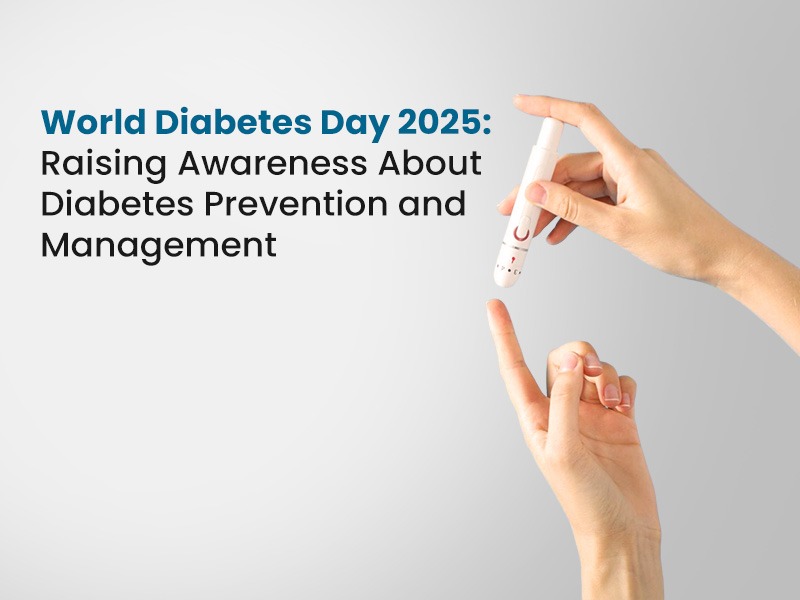People all over the world celebrate World Diabetes Day on November 14 to raise awareness about how diabetes is becoming more common and how important it is to find it early, stop it, and treat it. The theme for 2025, “Diabetes and Well-being,” emphasizes how living a healthy, balanced life plays a vital role in managing blood glucose levels and preventing diabetes-related complications.
Understanding World Diabetes Day 2025
World Diabetes Day was founded by the World Health Organization (WHO) and the International Diabetes Federation (IDF) honor the birthday of Sir Frederick Banting, one of the discoverers of insulin. More than 160 countries are taking part in it, making it one of the biggest health awareness campaigns in the world.
World Diabetes Day 2025 is all about teaching people about diabetes symptoms, causes, prevention, and management. The theme "Diabetes and Well-being" reminds us that we need to be physically, mentally, and emotionally well for long-term diabetes control.
What is Diabetes?
Diabetes mellitus is a chronic illness in which the body either doesn't produce enough insulin or cannot effectively use the insulin it produces. Insulin is the hormone responsible for regulating blood glucose levels, and any imbalance can lead to increased blood sugar, affecting vital organs such as the heart, kidneys, eyes, and nerves.
There are different types of diabetes, and each one has its own causes and risk factors. Understanding them helps in early diagnosis and appropriate management.
Types of Diabetes
1. Type 1 Diabetes:
This is an autoimmune disease in which the body's immune system attacks insulin-producing cells in the pancreas. It usually starts in childhood or adolescence and requires lifelong insulin therapy.
2. Type 2 Diabetes:
This is the most common type. It happens when the body doesn't make enough insulin or becomes resistant to it. It is closely linked to obesity, poor diet, sedentary lifestyle, and family history.
3. Gestational Diabetes:
This type affects some women during their pregnancy and increases the risk of developing Type 2 diabetes later in life.
4. Prediabetes:
The blood sugar levels are higher than normal, but not high enough to be labeled diabetes. Early treatment can help prevent progression to Type 2 diabetes.
Common Signs and Symptoms of Diabetes
It is very important to recognize the early signs of diabetes for timely treatment. Common diabetes symptoms include:
● Increased thirst and frequent urination
● Unexplained weight loss
● Excessive hunger
● Blurred vision
● Slow healing of wounds
● Tiredness and irritability
● Tingling or numbness in hands and feet
If these signs of diabetes are ignored, they can lead to serious diabetes complications affecting the heart, kidneys, eyes, and nervous system.
Causes and Risk Factors
Diabetes causes may vary depending on the type, but there are several common risk factors, including:
● Family history of diabetes
● Being overweight or obese
● Not getting enough exercise
● High cholesterol or blood pressure
● Unhealthy diet high in sugar and refined carbohydrates
● Hormonal changes during pregnancy
● Increasing age
Some risk factors can't be changed, however, adopting a healthier lifestyle life can significantly lower the risk of developing diabetes.
Diabetes Complications
If diabetes isn't treated properly, it can lead to long-term complications that affect multiple organs. These include
● Cardiovascular diseases such as heart attack and stroke
● Kidney damage (diabetic nephropathy)
● Nerve damage (diabetic neuropathy)
● Eye damage (diabetic retinopathy)
● Foot ulcers and infections that may lead to amputation
At Park Group of Hospitals, comprehensive diabetic care programs focus on early detection, complication prevention, and patient education, helping individuals manage diabetes effectively.
How to Prevent Diabetes
Changing your behaviors and keeping an eye on your health are the first steps to avoiding diabetes. Here are some practical steps on how to prevent diabetes:
● Avoid sugary beverages and processed foods
● Eat a balanced diet that contains whole grains, fruits, and vegetables
● Maintain a healthy weight through balanced eating and exercise
● Work out for at least 30 minutes every day
● Keep an eye on your blood sugar levels
● Quit smoking and limit alcohol intake
● Get regular health check-ups especially if you have a family history of diabetes
The Park Group of Hospitals' preventive health packages include early screenings and consultation with experts to lower the future risk.
Diabetes Management and Care
You need to consult a doctor, modify how you live, and check on your health often to take proper care of your diabetes. Diabetes management focuses on keeping blood glucose levels within the target range through:
● Medicine or insulin therapy as advised by the doctor
● A healthy diet plan
● Work out regularly
● The use of glucose monitors or continuous monitoring systems to check blood sugar
● Dealing with stress and get enough sleep
● Regular consultations with diabetologists and endocrinologists
Park Group of Hospitals offers advanced diagnostic facilities, personalized treatment plans, and counseling to help patients achieve long-term control over diabetes and maintain overall well-being.
The Role of Park Group of Hospitals in Diabetes Care
Park Group of Hospitals is dedicated to providing complete diabetes care through a team-based approach. Our team of experts can help you with:
● Accurate diagnosis using advanced glucose monitoring systems
● Personalized diabetes management plans
● Dietary counseling and lifestyle education
● Screening for diabetes complications
● Patient support groups and awareness initiatives
Park Hospital’s clinical expertise and care for the patients help people live better lives without diabetes.
Conclusion
World Diabetes Day 2025 reminds us that diabetes is preventable and manageable with awareness, timely care, and healthy living. The theme “Diabetes and Well-being” reinforces the importance of holistic health and the collective responsibility to reduce the global diabetes burden.
Park Group of Hospitals focus on empowering people through skilled care, education, and prevention. Together, we can envision a healthier, diabetes-free world for future generations.
At Park Group of Hospitals, with advanced centers across North India including Delhi, NCR, Punjab Haryana, Rajasthan, expert diabetologists, endocrinologists, and nutritionists work together to provide personalized diabetes care and education. Park Hospital's 24x7 service helpline +91 99166 99166 ensures timely support and advanced treatment for every patient.


























